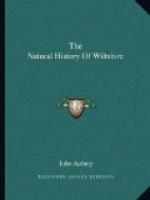now in the great pannells of the wainscot in the great
dining roome, or roome of state; which is a magnificent,
stately roome; and his Majesty King Charles the Second
was wont to say, ’twas the best proportioned
roome that ever he saw.* In the cieling piece of this
great roome is a great peece, the Marriage of Perseus,
drawn by the hand of Mr. Emanuel De Cretz; and all
about this roome, the pannells below the windows, is
painted by him, the whole story of Sir Philip Sydney’s
Arcadia, Quaere, Dr. Caldicot and Mr. Uniades, what
was the story or picture in the cieling when the house
was burnt. At the upper end of this noble roome
is a great piece of Philip (first) Earle of Pembroke
and both his Countesses, and all his children, and
the Earle of Carnarvon, as big as the life, with landskip
beyond them; by the hand of that famous master in
painting Sir Anthony Van Dyk, which is held one of
his best pictures that ever he drew, and which was
apprized at 1,000 li. by the creditors of Philip the
third earle of Pembrok. Mr. Uniades told me that
he heard Philip (first) Earle say, that he gave to
Sir Anthony Van Dyk for it five hundred Jacobuses.
’Tis an heirloome, and the creditors had nothing
to doe with it, but Mr. Davys the painter, that was
brought from London to apprize the goods, did apprize
it at a thousand pounds. Captain Wind tells me
that there is a tagliedome of this great picture:
enquire for it. [A critical account of this picture,
which is 17 feet in length by l1 feet in height, and
contains ten full-length portraits, will be found
in the Beauties of Wiltshire, vol. i. p. 180-187.
It was engraved by Bernard Baron in 1740. —
J. B.]
[This refers to the “double-cube” room,
as it is often called, from its proportions.
The Great Hall at Kenilworth was also a double cube;
and the same form was adopted in many other old buildings.
- J. B.]
[In “A Description of the Antiquities and Curiosities
in Wilton House,” 4to. these paintings are ascribed
to Signer Tomaso and his brother.-J. B.]
The anti-roome to the great roome of state is the
first roome as you come up staires from the garden,
and the great pannells of wainscot are painted with
the huntings of Tempesta, by that excellent master
in landskip Mr. Edmund Piers. He did also paint all
the grotesco — painting about the new buildings.
[Ascribed to Tempesta junior in the “Description”
already mentioned.-J. B.]
In the roome within this great roome is the picture
of King Charles the First on his dun horse by Van
Dyk; it hangs over the chimney. Also the Dutchess
of Richmond by Van Dyk. Now this rare collection
of pictures is sold and dispersed, and many of those
eminent persons’ pictures are but images without
names; all sold by auction and disparkled by administratorship:
they are, as the civilians term them, “bona
caduca”. But, as here were a number of pictures
sold, with other goods, by the creditors of Philip
(the second), so this earle [Thomas] hath supplied
it with an admirable collection of paintings by great
masters in Italy, when his lordship was there, and
since; as he also did for prints, and bookes of fortification,
&c.




